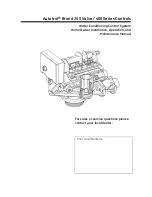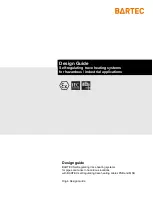
66
•
To avoid any risk of accidental short circuit or ignition of the arc, do not place the electrode
holder directly on the workbench or any metal surface connected to the ground clamp of the
machine.
WARNING:
Electromagnetic fields generated by high welding currents can cause the malfunction
of vital electronic devices.
6.7. PREVENTION OF TOXIC FUMES.
The following precautions should be taken to prevent exposure of the operator, other people and
animals to the toxic fumes that may be generated during the welding process.
•
Avoid welding operations on painted surfaces, or with oil or grease.
•
Some chlorinated solvents can decompose during welding and generate dangerous gases such
as phosgene. It is therefore essential to ensure that such solvents are not present in the pieces
to be welded. Otherwise, they will need to be removed prior to welding. You should also make
sure that these solvents, or other unpleasant agents, are not in the immediate vicinity of the
work area.
•
Metal parts coated with or containing lead, graphite, cadmium, zinc, mercury, beryllium or
chromium may cause dangerous concentrations of toxic fumes and should not be subjected to
welding operations unless:
•
The coating is removed before starting welding.
•
The work area is properly ventilated.
•
The operator uses an adequate smoke extraction system.
•
NEVER work in a place without proper ventilation.
6.8. PREVENTION OF FIRE.
•
During the welding process, the metal is heated to very high temperatures and sparks and slag
may be projected. Appropriate precautions must be taken to prevent fires and/or explosions.
•
Avoid working in areas with containers of flammable substances.
•
All fuels and/or combustible products must be kept far away from the work area.
•
Extinguishers should be located nearby and accessible.
•
Special precautions must be taken when welding:
➢
containers that have contained flammable substances.
➢
inside metal containers or in places with little ventilation.
•
These operations must always be carried out with the presence of qualified staff who can
provide the necessary assistance if required.
•
NEVER work in environments whose atmosphere contains flammable gases or combustible
vapors (such as oil or its vapors).
6.9. EXTENSION CORD.
•
Replace damaged cables immediately. The use of damaged cables can result in electric shock,
burns or electrocution.
•
Shall an extension cable be necessary, it must be used with the appropriate size of conductors
and an admissible power equal to, or greater than that indicated on the nameplate of the
machine or in this manual.
•
The extension cable must have a ground conductor and be connected to a power source with a
ground connection.
EN
















































